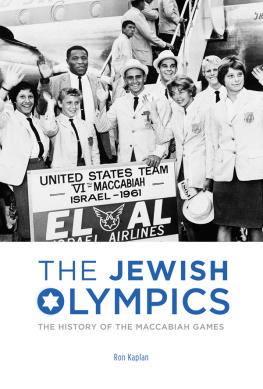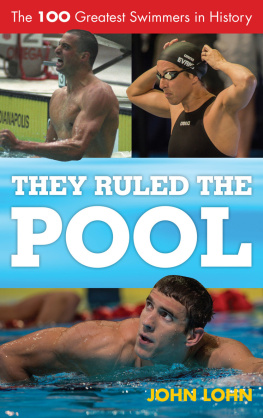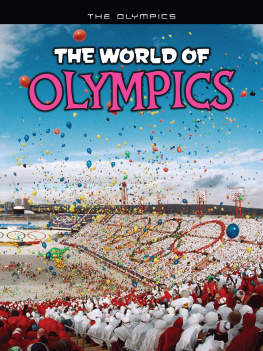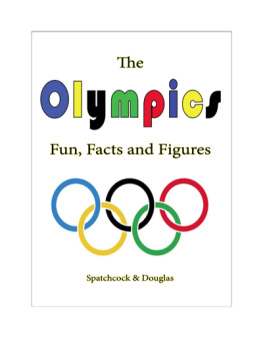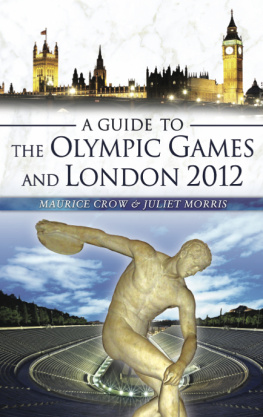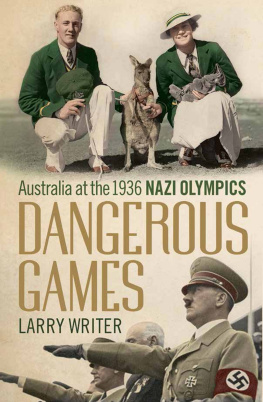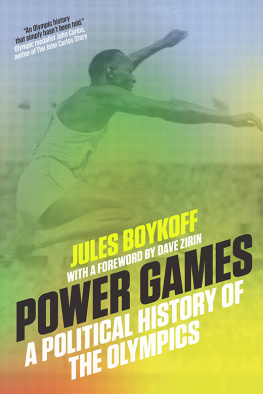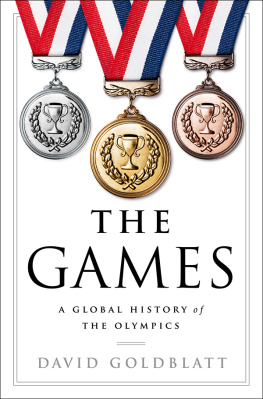Copyright 2015 by Ron Kaplan
All rights reserved. No part of this book may be reproduced in any manner without the express written consent of the publisher, except in the case of brief excerpts in critical reviews or articles. All inquiries should be addressed to Skyhorse Publishing, 307 West 36th Street, 11th Floor, New York, NY 10018.
Skyhorse Publishing books may be purchased in bulk at special discounts for sales promotion, corporate gifts, fund-raising, or educational purposes. Special editions can also be created to specifications. For details, contact the Special Sales Department, Skyhorse Publishing, 307 West 36th Street, 11th Floor, New York, NY 10018 or .
Skyhorse and Skyhorse Publishing are registered trademarks of Skyhorse Publishing, Inc., a Delaware corporation.
Visit our website at www.skyhorsepublishing.com.
10 9 8 7 6 5 4 3 2 1
Chapter-opening Maccabiah posters courtesy of The Joseph Yekutieli Maccabi Sports Archive.
Library of Congress Cataloging-in-Publication Data is available on file.
Cover design by David Sankey
Cover photo credit AP Images
ISBN: 978-1-63220-494-3
Ebook ISBN: 978-1-63220-855-2
This book is dedicated to the thousands of athletes, administrators, volunteers, and supporters who have made the Maccabiah Games a truly unique experience and, for many, a stepping stone to reconnecting the religion of their ancestors.
Contents
Foreword
by Ira Berkow
For an introspective look at the Maccabiah Games, or the so-called Jewish Olympics, one surely must start with the stereotypethe un-muscular Jew, as it were, the un-athletic Jew, the bookish nerdeven though one of the worlds earliest (it is believed to have occurred some 3,000 years ago) and greatest known athletes was a Jewish lad who could employ a slingshot courageously and with gold-medal deftness, the David who smote the giant Goliath, all six cubits and a span of him, according to 1 Samuel 17.
In this regard, in the 1980 American film, Airplane! , arguably one of the funniest moments is when a stewardess is asking a passenger if shed like something to read. The passenger, in turn, asks for something light. How about this leaflet? replies the stewardess, Famous Jewish Sports Legends?
Of course, there are more than a leaflets worth, to be sure, of notable Jewish athletes. The list goes beyond baseballs Sandy Koufax and Hank Greenberg; boxings Barney Ross and Benny Leonard; footballs Sid Luckman and Marshall Goldberg; swimmers Mark Spitz, Jason Lezak, and Lenny Krayzelburg; pro basketball stars Dolph Schayes and Ernie Grunfeld; tennis legend Dick Savitt; and the gymnasts Mitch Gaylord and Kerri Strug, who stunningly helped win a US gold medal while suffering a sprained ankle.
One might also include the forty-seven former Olympiansa number of whom were medal winnerswho perished in concentration camps in the Holocaust. Or the Holocaust survivor Ben Helfgott, the lightweight weightlifting champion who represented Great Britain in the 1956 and 1960 Olympics, as well as in the Maccabiah Games, and Olympic race walker Shaul Ladany, a Holocaust survivor who also managed by leaping from a balcony to escape the Arab terrorists who murdered eleven of his 1972 Israeli Olympic teammates in Munich. Ladany competed in the 1973 Maccabiah Games.
In Ron Kaplans finely researched, engaging, and compelling history of the Maccabiah Games, he indeed begins with the essential raison detre of Jews holding their own grand athletic competition, the first held, in 1932, as anti-Semitism was about to reach a horrible apex in Europe. It was a way to pridefully demonstrate and highlight a muscular Judaism.
Even into the seventh Maccabiah Games, in 1965, a fencer from New York University, Carol Benjamin, then ranked third in the United States, traveled to compete in Tel Aviv. So we get to Israel, Kaplan quotes her as saying, and I felt wonderful. It was the first time I had beenin a country that was filled with, primarily, Jewish people. The thing I really remember and that struck me as very amazing was, growing up you hear stereotypes of Jewish men as little old men with beards and scholars and bespectacled reading Torah and just spending a lot of time studying, not very physically strong. The perception changed for her at the opening ceremonies: They had all these young soldiers and young peoplein khaki shorts and shirts doing demonstrations. My whole impression of what a Jewish man was changed. It was striking.
Indeed, there was more to proving mere athleticism as a catalyst for the Maccabiah Games. For thousands of years, writes Kaplan, Jews had been forced to convert to other religions, exiled, shunned, denied businesses and educational opportunities, rounded up and pushed into ghettos, and/or brutally victimized in pogroms. The Games would also be a statement to the world that Jews were as physically capable as any other group and, as we would learn from the numerous Israeli-Arab wars, had become quite capable of fighting back.
But what separates Kaplan, the journalist and writer, from an ethnic cheerleader is the integrity of his report. For example, he explores where the Games may go wrong: sometimes a lack of high-quality athletes; the fact that the cost to get to Israel was only affordable to those with means (thus excluding some poorer athletes); the need to cut corners to allow, for example, an American citizen named Joseph Garrie, a judo athlete, studying at a college in Japan, to be the lone representative of Japan and carry the Rising Sun flag into the stadium in the opening ceremonies; the antagonism of the Ultra-Orthodox Jewish community who have sought to stop the frivolity of games that intrude on study; and, as Kaplan writes, the capper: a so-called Jewish Olympics by its nature excludes gentiles, which would seem anathema to a people who had been ostracized for millennia.
Kaplan also poses for consideration the age-old question, Who is a Jew? At the Maccabiah Games, different countries had their own requirements. The US maintained that either parent may be Jewish, while other nations, such as Australia, stated that ones mother had to be Jewish in order to be classified as a Jew. Yet, ironically, Israels stance is that all Israeli citizens are eligible to compete. Arab-Israeli Muslims indeed competed against their Jewish neighbors in the Maccabiah Games.
As it were, Spitz, Krayzelburg, Lezak, Savitt, Grunfeld, and Gaylord, among other world champions, participated and won gold medals in the Maccabiah Games, and Schayes coached an American team in the Games. And both Greenberg and Koufax were supporters. In 1934, Greenberg, then the 6-foot-3, 210-pound Detroit Tigers home-run hitter, attended a fundraising dinner for Maccabiahhis impressive presence alone was significant to the embryonic cause. Koufax, prior to the Seventh Maccabiah Games in 1965 underwrote the expenses for ten athletes.
Kaplan does not sidestep current politicsvis--vis Israeli Prime Minister Benjamin Netanyahu and President Barack Obama. Before the 19th Maccabiah Games, in 2013, Obama sent a congratulatory note to the Games committee. Its a celebration of the deep friendship among the competing nations, especially the unbreakable bond between Israel and the United States, he wrote. In that spirit I want to wish my good friend, President Shimon Peres, a very happy 90th birthday. Hes an example of the vitality and dedication to all of us and his legacy embodies the essence of these games.
It was missed by virtually no one that the name of a certain local Prime Minister was not mentioned, and which spoke to the ideological conflict, if not great personal dislike, between Obama and Netanyahu. Underscored was Prime Minister of England David Camerons companion congratulatory note, which did include a tip of the hat to Netanyahu.

